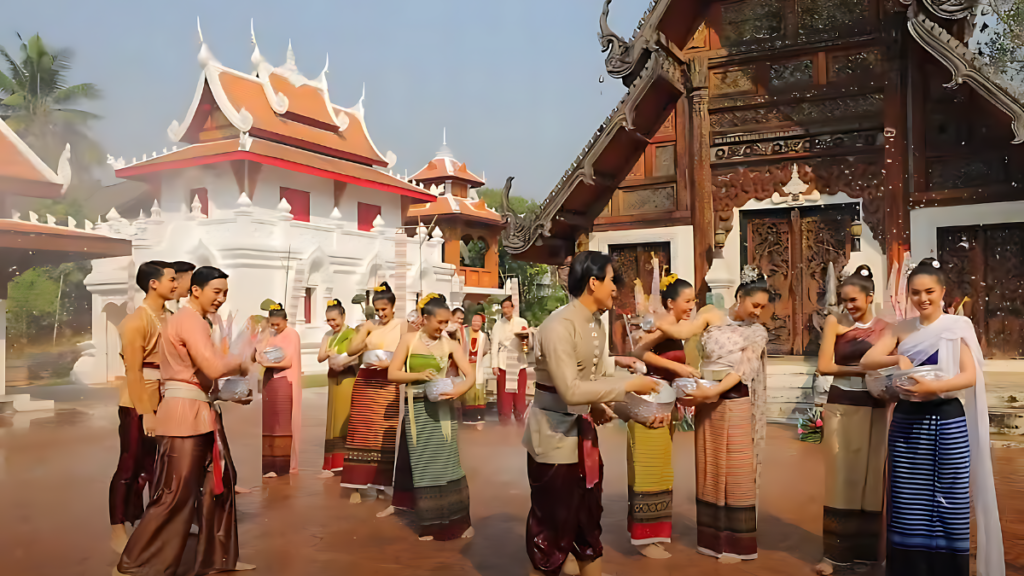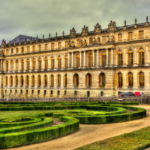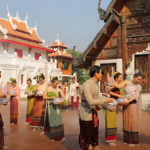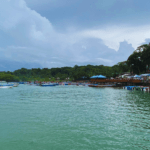Table of Contents
Songkran, the Thai New Year’s festival, is celebrated with the iconic Water Festival. UNESCO has formally recognized ‘Songkran in Thailand: Traditional Thai New Year Festival’ as an Intangible Cultural Heritage. Held in April, it marks the beginning of the traditional Thai lunar calendar. The festival is characterized by joyous water fights, where people splash water on each other as a symbol of cleansing and renewal. It’s a time for family reunions, paying respects to elders, and visiting temples for merit-making. Alongside the water festivities, Songkran also involves cultural rituals like pouring scented water over Buddha statues and offering prayers for prosperity and good fortune in the coming year.
7 Captivating Insights of Songkran
1. Origins and History of Songkran
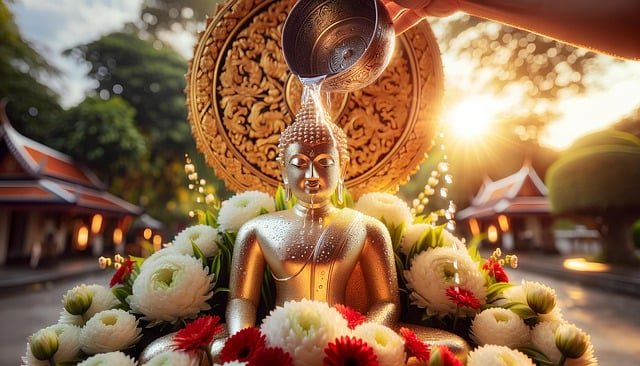
Songkran, the Thai New Year, traces its origins to ancient traditions rooted in Hindu and Buddhist beliefs. The word “Songkran” comes from Sanskrit, meaning “astrological passage” or “transformation.” Initially a time for cleaning and purification, it has evolved into a joyous water festival symbolizing the washing away of bad luck and sins. Traditionally celebrated in mid-April, it marks the beginning of the Thai solar calendar and is observed with colorful parades, temple visits, and water splashing activities. Today, it is a cherished cultural event, blending ancient customs with modern festivities to usher in the New Year with blessings and camaraderie.
Image: Dain Lim/ Pixabay
2. Comparison to other water festivals around the world
Thailand’s traditional New Year celebration, stands out among other water festivals worldwide. While India’s Holi celebrates with colorful powders and water, Songkran’s water fights symbolize cleansing and renewal. In contrast, Spain’s La Tomatina features tomato-throwing madness, and Brazil’s Carnaval involves street parties and samba dancing. Unlike these, it uniquely blends water rituals with Buddhist customs, fostering unity and goodwill. Each festival offers its own cultural significance and vibrant experiences, but Songkran’s spiritual essence and community spirit make it an unparalleled celebration of water and Thai culture.
Image: © Department of Cultural Promotion, Thailand
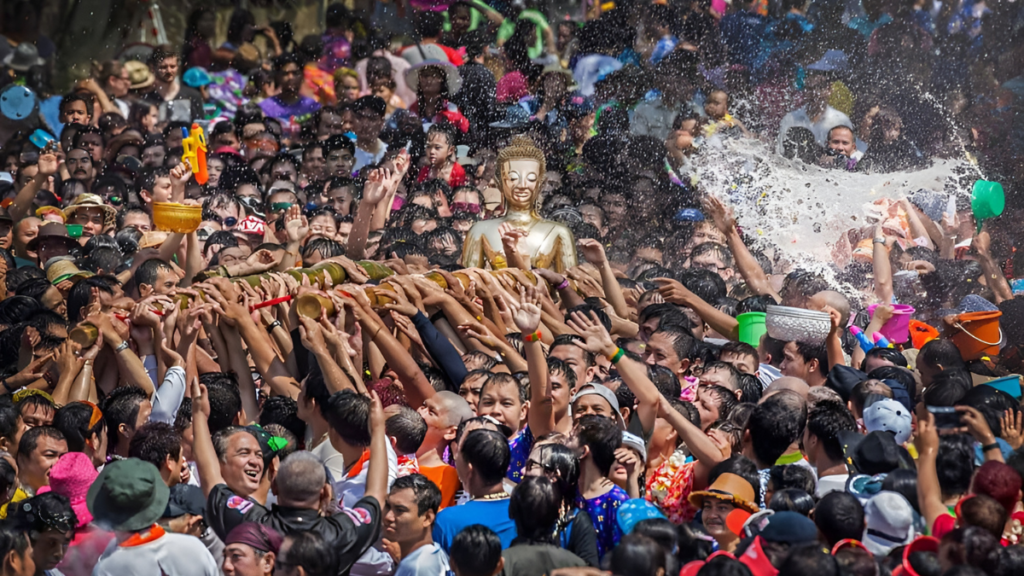
3. Traditional Rituals and Customs
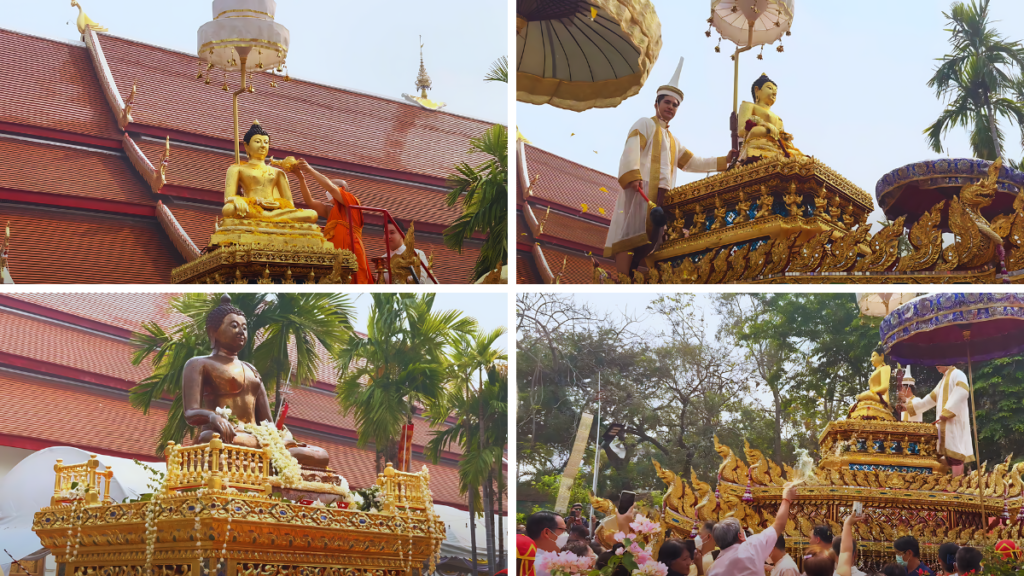
It is rich with traditional rituals and customs deeply rooted in Buddhist traditions. One of the most iconic customs is the water splashing ritual, where people pour water over Buddha statues and onto the hands of elders to symbolize purification, renewal, and blessings for the upcoming year. This act also signifies the washing away of misfortunes and sins, paving the way for a fresh start. Another important aspect of this tradition is the merit-making activities, including offering alms to monks, visiting temples for prayers and blessings, and releasing animals as acts of compassion.
Continue Reading…
Additionally, the making of sand pagodas or chedis is a symbolic gesture representing the accumulation of merit and good fortune. Family gatherings, feasting on traditional dishes, and participating in cultural performances further enrich the festive atmosphere. Through these cherished rituals and customs, Songkran serves as a time-honored celebration of unity, spirituality, and the enduring traditions of Thai culture.
4. Regional Variations of Songkran
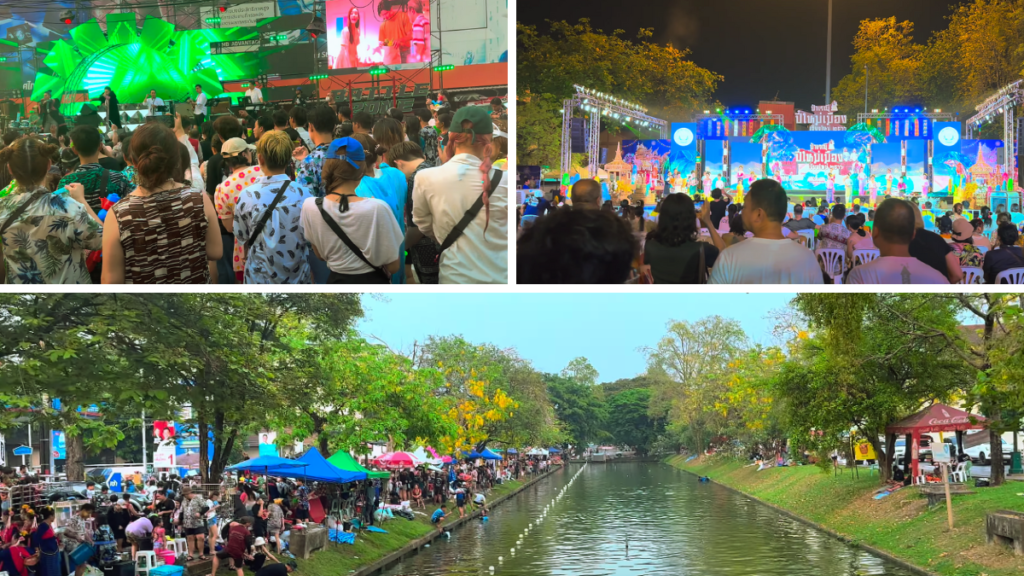
Songkran, the Thai New Year festival, manifests in various regional variations across Thailand. In Chiang Mai, Songkran is renowned for its exuberant water fights, where locals and tourists alike engage in spirited water battles using buckets, water guns, and hoses to usher in the new year with joy and laughter.
In Bangkok, Songkran celebrations often include vibrant parades, traditional ceremonies at temples, and the sprinkling of scented water on Buddha statues as a symbolic gesture of cleansing and purification.
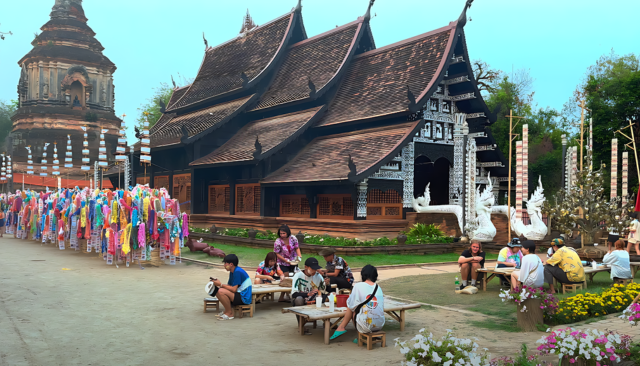
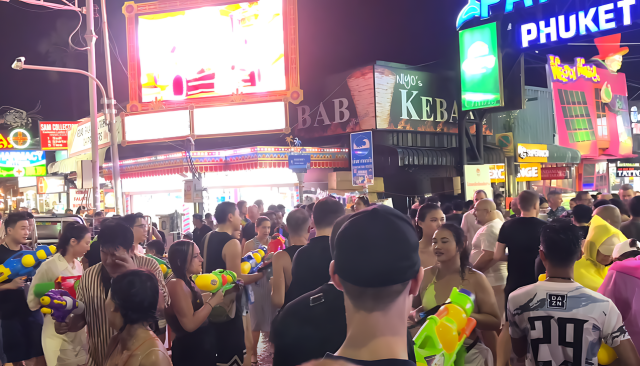
In Phuket, Songkran is marked by cultural performances, street processions, and elaborate water displays, drawing visitors from around the world to join in the festive revelry.
From the bustling streets of Pattaya to the tranquil villages of Isan, each region of Thailand puts its own unique spin on the Songkran festivities, showcasing the diversity and richness of Thai culture. Despite the regional variations, the spirit of this tradition remains consistent—a time for renewal, gratitude, and the celebration of community bonds.
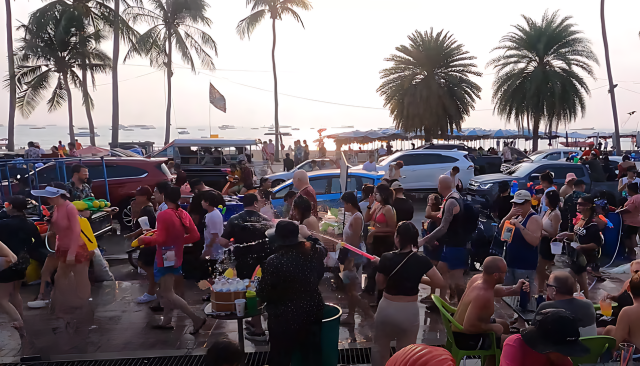
5. Role of tourism in shaping modern Songkran celebrations
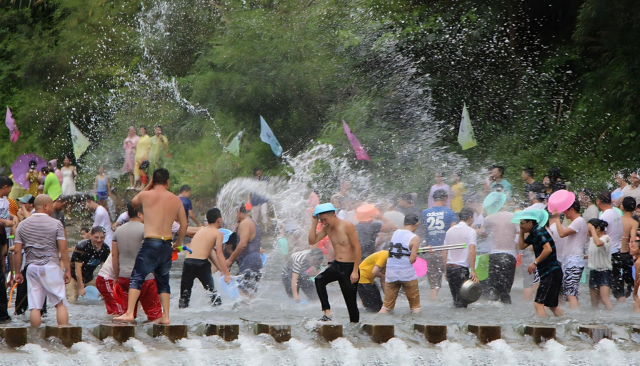
Tourism plays a significant role in shaping modern Songkran celebrations, transforming the traditional Thai New Year festival into a global phenomenon. As visitors flock to Thailand to experience the vibrant festivities, local communities adapt to accommodate the influx of tourists, leading to larger-scale and more commercialized events. The presence of international travelers has led to the development of specialized tourism packages and events tailored to cater to their interests, such as water fights in popular tourist destinations like Bangkok, Chiang Mai, and Phuket.
Photo: Pixabay
Moreover, tourism has influenced the evolution of this tradition, with modern celebrations incorporating elements from Western culture and entertainment to appeal to a diverse audience. While the essence of the festival remains rooted in Thai culture and spirituality, the influx of tourists has led to a fusion of traditional rituals with contemporary trends, creating a dynamic and inclusive atmosphere.
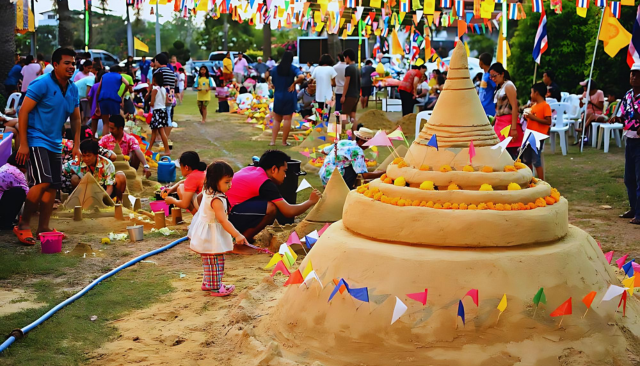
Image: © Department of Cultural Promotion, Thailand
Overall, tourism has not only contributed to the economic growth of Thailand but also played a pivotal role in shaping the modernization and globalization of Songkran celebrations, highlighting the cultural significance and adaptability of this cherished Thai tradition.
6. Songkran Food and Cuisine
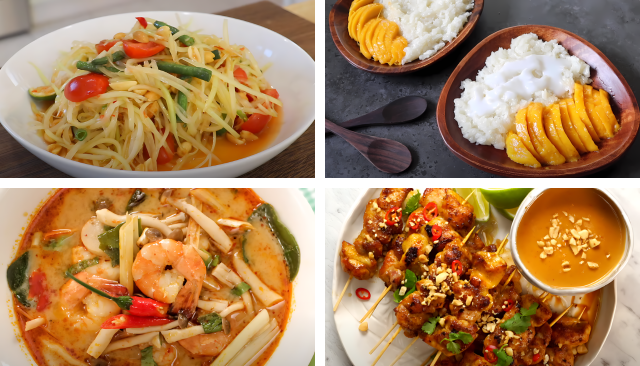
The Thai New Year, is celebrated with an array of delectable food and cuisine that embodies the spirit of this vibrant festival. Traditional dishes play a central role in Songkran festivities, with families and communities coming together to share meals and celebrate the arrival of the new year. Staple dishes include Pad Thai, a flavorful stir-fried noodle dish, Som Tum, a spicy green papaya salad, and Tom Yum Goong, a tangy and aromatic shrimp soup. Street food vendors offer an abundance of snacks and treats, such as crispy spring rolls, grilled satay skewers, and sweet mango sticky rice.
Continue Reading…
Refreshing beverages like Thai iced tea and coconut water provide relief from the scorching summer heat. Songkran is also a time for making merit through food offerings at temples and participating in communal feasts known as ‘Khan Tok‘ gatherings. With its diverse flavors and communal spirit, Songkran food and cuisine reflect the rich cultural heritage and festive atmosphere of this cherished Thai holiday.
7. Environmental and Safety Concerns
The excessive water usage during the Thai New Year festival, poses significant environmental concerns. Prolonged water splashing can lead to water scarcity, especially in drought-prone regions, and strain local water resources. Additionally, the indiscriminate use of water mixed with chemical dyes can pollute rivers and water bodies, harming aquatic life and ecosystems. To mitigate these environmental impacts, participants and revelers can opt for eco-friendly celebrations by using less water, avoiding chemical dyes, and participating in dry or water-saving activities. Furthermore, promoting awareness about water conservation and responsible usage can help foster a more sustainable approach to celebrating Songkran.
Continue reading…
In addition to addressing environmental concerns, ensuring the safety of participants and revelers during Songkran is paramount. Safety measures include wearing appropriate footwear to prevent slips and falls, refraining from excessive alcohol consumption to maintain awareness, using sunscreen to protect against sunburn, and avoiding crowded areas to reduce the risk of accidents. Moreover, practicing mindfulness and respect towards others’ boundaries and consent can contribute to a safer and more enjoyable celebration for all.
Final thoughts
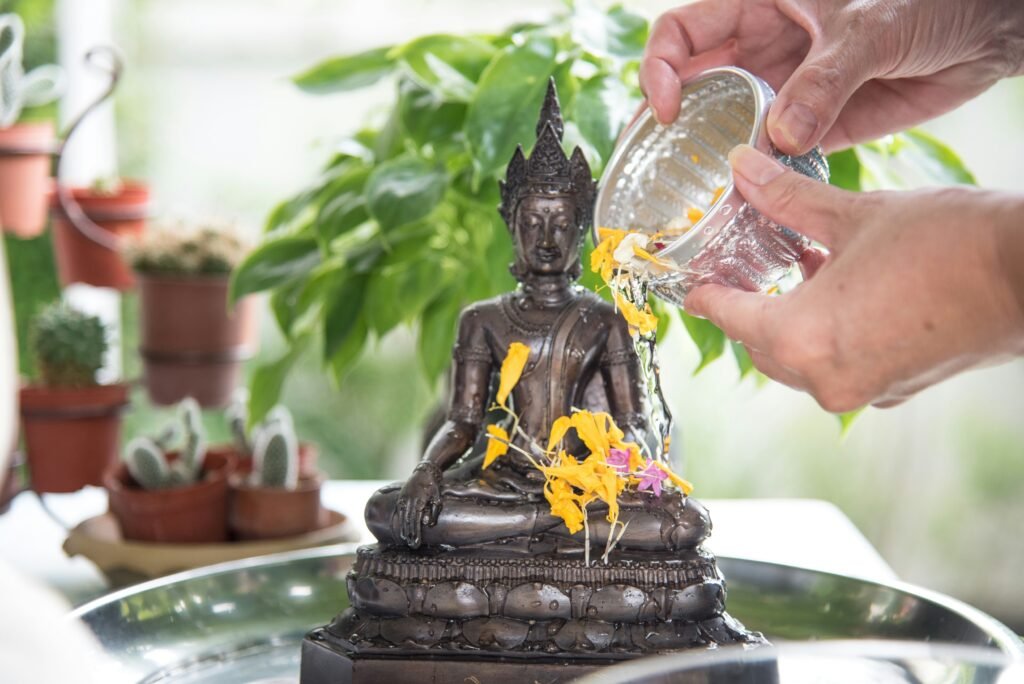
Let’s heed the call to embrace the essence of unity, renewal, and celebration encapsulated by Songkran. As we immerse ourselves in this vibrant festival, let us honor the traditions that bind communities together, symbolizing the renewal of spirit and the triumph of hope over adversity. From the spirited water fights to the solemn rituals paying homage to ancestors, Songkran represents a time of reflection, gratitude, and joyous gatherings. Let’s cherish this opportunity to connect with loved ones, strengthen bonds, and spread goodwill to all. The essence of Songkran motivate us to welcome one another with open hearts, strive for unity amidst our differences, and eagerly anticipate a brighter future ahead.
Explore cultures from different parts of the world
Stay Updated and Inspired!

